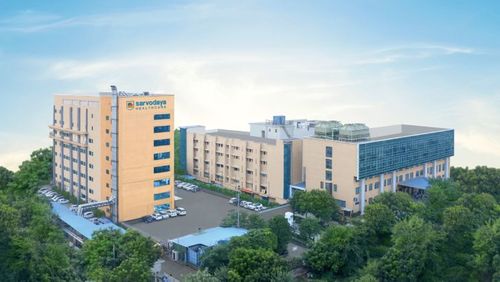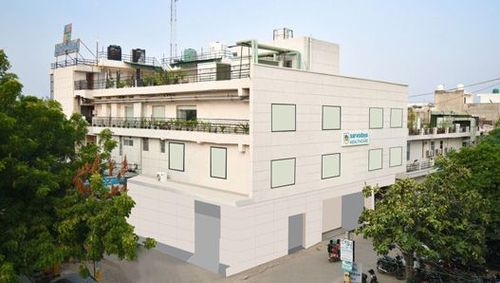Overview
Inflammatory Bowel Disease (IBD), including Crohn’s disease and ulcerative colitis, causes chronic inflammation of the digestive tract, leading to persistent symptoms and serious complications if untreated. Treatment focuses on reducing inflammation, relieving symptoms, maintaining remission, and preventing long-term issues.
At Sarvodaya Hospital, a leading Gastroenterology Hospital in Delhi NCR, our expert team of gastroenterologists, hepatologists, and surgeons offers holistic care with advanced diagnostics, medications, lifestyle guidance, and surgical support, ensuring comprehensive management of liver and digestive disorders.
Inflammatory Bowel Disease Symptoms
- Persistent diarrhoea (often bloody)
- Abdominal cramping and pain
- Urgent bowel movements
- Feeling of incomplete evacuation
- Rectal bleeding
- Fatigue
- Unexplained weight loss
- Fever during active phases
- Loss of appetite
- Anaemia from chronic bleeding
- Joint pain
- Skin problems
- Eye inflammation
Causes of Inflammatory Bowel Disease
- Genetic predisposition or family history
- Overactive immune response attacking the digestive tract
- Chronic inflammation of the intestines
- Environmental triggers such as poor diet, stress, or smoking
- Infections or changes in gut bacteria
- Autoimmune conditions linked to the digestive system
Diagnosis of Bowel Disease
Accurate diagnosis of bowel disease ensures proper identification of the condition, assessment of its extent, and planning of personalised treatment under expert gastroenterologist in Delhi NCR.
- Clinical assessment and medical history – Detailed evaluation of symptoms, lifestyle factors, and family history forms the first step in identifying inflammatory or functional bowel disorders.
- Laboratory investigations – Blood tests, including ESR, CRP, and complete blood count, help detect inflammation and anaemia, while stool studies rule out infections and identify gut-related issues.
- Endoscopic procedures – Colonoscopy with biopsy remains the gold standard, allowing direct visualisation of inflammation and collection of tissue samples for accurate diagnosis.
- Advanced imaging – CT enterography, MRI enterography, and capsule endoscopy provide precise assessment of bowel involvement, disease severity, and complications.
- Differentiating conditions – Careful evaluation is necessary to distinguish Crohn’s disease from ulcerative colitis, as treatment strategies differ significantly.
- Ongoing monitoring – Imaging and repeat endoscopy may be used to track response to therapy and modify treatment plans accordingly.
Treatment of Inflammatory Bowel Disease
- Aminosalicylates (5-ASA/mesalamine) – First-line therapy for mild disease, reducing intestinal inflammation and maintaining remission in selected patients.
- Corticosteroids – Used for moderate disease flares to quickly control inflammation, but not suitable for long-term maintenance due to side effects.
- Immunomodulators (azathioprine, mercaptopurine, methotrexate) – Help suppress the immune response and maintain remission when standard medications are insufficient.
- Biologic therapies (infliximab, adalimumab, vedolizumab) – Target specific inflammatory pathways and are effective for moderate to severe cases of IBD.
- Small molecule drugs (JAK inhibitors) – Oral medications for patients with refractory disease who do not respond adequately to biologics or other treatments.
- Surgery – Considered when complications such as strictures, perforations, abscesses, or medically refractory disease occur, often improving quality of life and disease outcomes.
Prevention & Lifestyle Modification for Inflammatory Bowel Disease
- Dietary adjustments – Eating a balanced, anti-inflammatory diet rich in fruits, vegetables, lean proteins, and omega-3 fatty acids helps reduce flare risks. Limiting processed foods, dairy, and high-fat meals can also support better gut health.
- Regular exercise – Moderate physical activity, such as walking, yoga, or swimming, improves immunity, reduces stress, and enhances bowel function, making it an important part of inflammatory bowel disease treatment and management.
- Stress management – Stress is a known trigger for IBD flares. Mind-body techniques like meditation, breathing exercises, and mindfulness practices help maintain emotional balance and lower relapse risks.
- Quit smoking – Smoking worsens Crohn’s disease and interferes with treatment effectiveness. Quitting tobacco significantly improves outcomes and lowers disease complications.
- Adequate hydration – Drinking enough fluids prevents dehydration, especially during flare-ups, and supports overall digestive function.
- Sleep and rest – Maintaining a proper sleep routine strengthens immunity, reduces inflammation, and supports recovery from IBD flares.
- Regular medical follow-ups – Ongoing check-ups, colonoscopies, and timely medication adjustments with an IBD specialist ensure long-term co
Pre–Post Inflammatory Bowel Disease Treatment Care
Before treatment
- Comprehensive evaluation, including colonoscopy, imaging studies, and laboratory assessment, to establish an accurate diagnosis and disease extent
- Nutritional assessment and correction of deficiencies, including iron, vitamin B12, folate, and Vitamin D-Rich Foods
- Screening for tuberculosis and hepatitis before starting immunosuppressive therapy
- Patient education about the disease process, treatment options, and the importance of medication adherence.
After treatment
- Regular monitoring through clinical assessment, laboratory tests, and endoscopic evaluation to assess treatment response
- Medication adherence support and management of side effects from immunosuppressive therapies
- Nutritional counselling and dietary modifications to maintain optimal nutritional status
- Long‑term surveillance for complications, including colorectal cancer screening in established colitis
- Psychological support for coping with chronic disease and its impact on quality of life.











